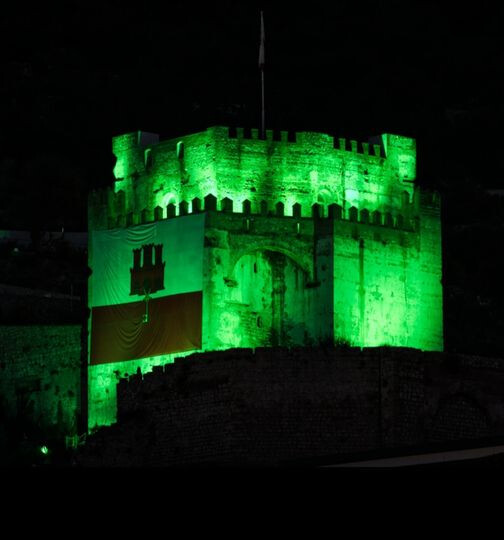9th September 2023
A powerful earthquake about 50 miles from the Moroccan city of Marrakesh has killed over 1000 people, according to Moroccan authorities engaged in a frantic effort to rescue survivors.
Morocco’s Interior Ministry said early Saturday that the victims had died after the earthquake struck in the High Atlas Mountains shortly after 11 p.m. and that hundreds more had been transported to hospitals with injuries.
In Gibraltar, relatives of a group of four young people from the Rock on holiday in Marrakesh lived hours of anguish as the news filtered through late last night.
All four are safe and managed to make their way to Tangier in a taxi and then to Tarifa by ferry, but described scenes of horror in phone conversations with their families as they worked out what to do in the hours immediately after the earthquake.
Zhané Vassallo and her partner Ferran Cañadillas Castells, two GHA workers, were staying in the Riad Niza together with Hannah Alba, also a GHA employee, and Jasmeen Kaur for a short break.
The couple were dining nearby when the earthquake struck and had to climb over rubble in narrow alleyways of a souq to retrieve belongings including a passport.
A photo taken by Zhané and sent to her family [above] shows the damage just metres from where they were staying.
Jessica Vassallo Segui, Zhané’s mum, said the group initially made its way to the airport, both for safety and to try to get a flight out of the city.
But all flights were cancelled and they were stranded at the airport.
Ms Vassallo Segui and her husband, Steven Segui, prepared to set off to Morocco to drive south and collect them but before they could leave, a call from the group confirmed they had found a taxi to drive them to Tangier.
By dawn they were past Casablanca on their way to Tangier for a ferry to Tarifa, where they arrived late afternoon to be reunited with their relatives who were waiting for them.
“They’re all OK thank God, but she told me they’ve had a really rough time,” Ms Vassallo Segui told the Chronicle, speaking early on Saturday morning.
“It’s hit me when I’ve seen the news and I’ve seen over 600 people have died.”
“I thought to myself, my God, my daughter and her friends have been so lucky, they’ve had a guardian angel.”
Another Gibraltar resident, Noemi Jimenez, had been due to leave Marrakesh on Friday night at 10.10pm but her Ryanair flight to Malaga was delayed by about an hour.
The earthquake hit just as it was taking off.
“As we were taking off, we heard a very loud noise, it was like an explosion,” she said.
“We thought it was the plan at first but then someone shouted ‘look, look’.”
“We could see lights flickering and buildings moving.”
“I don’t know how to explain it.”
It was only when they landed that they began to understand what had happened.
Ms Jimenez had been on a three-day team building event with colleagues from work, some of whom extended their trip and were still in Marrakesh.
All are safe but in calls and messages to colleagues described distressing scenes on the ground.
They had spent the night outside by their hotel pool and were hoping to be able to fly back on Sunday.
Ms Jimenez is still in shock and worried for her colleagues on the ground, but knows how lucky she and the others on the plane had been.
“We missed it by minutes,” she said, now back in Gibraltar.
“Just another few minutes and we’d still be there.”
The earthquake, measured at a 7.2 magnitude by Morocco’s own seismic agency, toppled several buildings across cities in southern Morocco and sent people running from their homes late at night.
Morocco’s interior ministry said the tremors hit the provinces of Al Haouz, Ouarzazate, Marrakech, Azilal, Chichaoua, and Taroudant.
The epicentre of the earthquake was near the town of Ighil in Al Haouz province, roughly 43 miles south of Marrakesh.
Videos shared on social media showed people running out of restaurants and apartment buildings and congregating outside as rubble fell from buildings, some of which collapsed entirely.
A British journalist living in Morocco said he was woken up by the sound of his wife screaming as an earthquake shook his home.
Speaking to BBC Radio 4’s Today programme, Martin Jay said: “The first hint was my wife screaming,” he said.
“We both had nodded off to sleep – but not into deep sleep – just into that light slumber I suppose… and she started screaming, and I just sort of opened my eyes and couldn’t quite join the dots up.
“I couldn’t quite equate the situation, I couldn’t imagine I was in the middle of an earthquake.
“Everything was vibrating, everything, the bed, the floor, the four walls.”
At least 1,037 people died, mostly in Marrakech and five provinces near the quake’s epicentre, and another 1,204 people were injured, Morocco’s Interior Ministry reported on Saturday. Of the injured, the ministry wrote, 721 were in critical condition.
But the full death toll of the most powerful quake to hit Morocco in 120 years will not be known until rescuers complete the challenging journey to the remote mountain villages that were the hardest hit.
Joanna Faure Walker, Professor of earthquake geology and head of the UCL Institute of Disaster Risk Reduction, said it was likely to rise.
“When an earthquake occurs at night, people can be particularly vulnerable as getting out of their homes and navigating rubbles and debris in the dark adds to risk of injury and getting trapped,” she said.
“The early death toll figures are likely to increase significantly as early information is limited and rescue efforts are ongoing.”
In Gibraltar, government contingency officials were ready to liaise with other Gibraltarians in Marrakesh at the time of the earthquake to assist them.
Although there are no exact figures as yet, the indications are that there were numerous Gibraltar residents in the Moroccan city for the long weekend.
On Saturday morning, the Government of Gibraltar expressed its sympathy and solidarity with Morocco and its people, offering any assistance it can give to the Moroccan authorities.
Chief Minister, Fabian Picardo, said: “The news of the earthquake and, regrettably, the significant loss of life and damage that has occurred as a consequence, is news that will be received by all of us here in Gibraltar with much sadness.”
“The Government of Gibraltar, for itself and on behalf of the people of Gibraltar, wishes to convey our thoughts and prayers to our friends and neighbours to the south and, in particular, to our wonderful Moroccan community here at home.”
“I regrettably expect that there will be those in our community today who find themselves affected by grief and loss, and I wish to send them both our heartfelt condolences and the help we might be able to offer.”
“I have today written to King Mohammed VI, to offer our help to the Kingdom and country of Morocco, and to express our support for all those caught up in this tragedy.”
As the UK offered assistance too, Prime Minister Rishi Sunak said his thoughts are with everyone affected by the “terrible” earthquake.
“The UK stands ready to support our Moroccan friends,” the Prime Minister wrote on social media, in a message that echoed that of Foreign Secretary James Cleverly.
Mr Cleverly pledged support in “whatever way we can”.
The Foreign Office updated its advice to Britons in the country, telling them to “follow local media and safety instructions from local authorities”.
On Saturday afternoon the Gibraltar Government issued further advice to anyone in Gibraltar concerned about relatives or friends in Morocco.
The Moroccan community in Gibraltar also organised a vigil outside No6 Convent Place, attendees include Mr Picardo, the Governor, Vice Admiral, Sir David Steel, UK MPs who were visiting for the National Day rally, Leader of the Opposition, Keith Azopardi and Steven Marin from the Gibraltar Morocco Business Association.



Residents of Gibraltar who are concerned about family or friends who may have been affected by the earthquake in Morocco and who they haven’t heard from should contact the British Embassy in Rabat for support and advice on +212 (0) 537 633 333.
The Royal Gibraltar Police is unable to provide consular assistance but may be able to redirect queries to the British Embassy in Rabat. The RGP control room number is 200 72500.
Further advice is available via the UK FCDO website: https://www.gov.uk/guidance/how-to-deal- with-a-crisis-overseas
EDITOR'S NOTE: An early version of this story wrongly said the group had found a taxi to take them to Marrakesh to catch a ferry to Tarifa or Algaciras. It should have read Tangier, and the article has been corrected.




